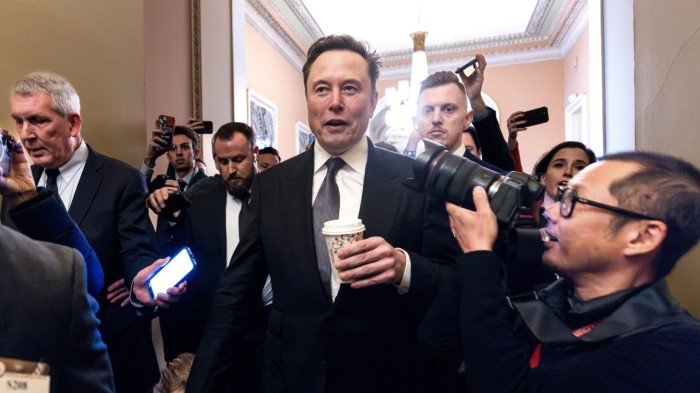Unlock the White House Watch newsletter for free
Your guide to what the 2024 US election means for Washington and the world
Republicans weighing Donald Trump’s cabinet nominations and proposed budget cuts face the threat of retaliation from Elon Musk if they vote down parts of the incoming administration’s agenda.
The multi-billionaire, who spent more than $250mn on Trump’s campaign and has been at the president-elect’s side in Mar-a-Lago since his election win, has suggested those who frustrate the administration’s plans should face a primary challenge.
He has also said elected officials who do not agree to slash the US’s national debt “need to be fired next election cycle”.
Musk, who visited Capitol Hill on Thursday to discuss his plans to drastically downsize the US government, has also privately suggested backing grassroots campaigns against Republican dissenters, said a person with knowledge of the matter.
“Those who oppose reform will lose their primary/election. Period,” Musk posted on X last Sunday.
He was replying to a Charlie Kirk post in which the conservative influencer said it “wouldn’t be hard” to unseat Republican senator Mike Rounds, who declined to fully endorse Kash Patel as head of the FBI in advance of his confirmation hearings. The junior senator from South Dakota is up for re-election in 2026.
Georgia Republican congresswoman Marjorie Taylor-Greene suggested last month that Musk’s America Pac, a political action committee that became one of Trump’s main fundraising vehicles, would “primary people that get in the way and stand against the [Maga] agenda”.
Taylor-Greene will be working with Musk on his department of government efficiency, the mooted body Trump has made responsible for slashing government bureaucracy.
Musk has not explicitly stated he would use the Pac to unseat incumbent lawmakers. However, he has vowed to deploy its resources in the lead-up to the midterms, when it will “of course play a significant role in primaries”.
While the backing of primary challengers by Super Pacs is hardly new, it is an “escalation” for someone with the “almost limitless financial resources of Musk” to help unseat those who dissent, said Saurav Ghosh, the director of federal campaign finance reform at Campaign Legal Center, a non-profit focused on advancing democracy through law.
“True to his public persona [Musk] seems to have seen an opening and really just pressed it much harder than anyone else,” Ghosh added.
Musk did not respond to a request for comment.
A spokesperson for America Pac declined to comment on the organisation’s plans to challenge sitting Republican lawmakers.
Chris Young, a former pharma lobbyist who is now running the Pac, did not respond to requests for comment, nor did Round’s office.
While Musk’s interest in primary challenges marks a “major new entrant” in the campaign finance arena, there is no guarantee that his significant war chest would make a big difference, said Daniel Weiner, a director at the Brennan Center for Justice and a former Federal Election Commission lawyer.
“It’s already a very populated ecosystem,” Weiner said.
“The Senate Republican leadership has their own Super Pac, and traditionally that Super Pac, which also raises hundreds of millions of dollars, has defended incumbents.”
Sitting senators also have a statistical advantage. According to the team behind Louisiana senator Bill Cassidy’s re-election campaign, no incumbent US senator has lost in a primary in the past 200 elections.
Cassidy this week faced a challenge from Louisiana treasurer John Fleming, who claims the senator betrayed his Republican base by voting to impeach Trump in 2021. Cassidy has had no trouble raising money, amassing more than $5.8mn in donations for his 2026 campaign.

Some of Musk’s targets, such as Republican senators Lisa Murkowski and Susan Collins, who he criticised for voting through President Joe Biden’s judicial nominees, have also easily survived previous primary attempts.
“I’m sure [Musk] is going to aim at people like Lisa Murkowski and Susan Collins,” Weiner said.
“But those people also have had no trouble raising money on their own.”
Read the full article here




